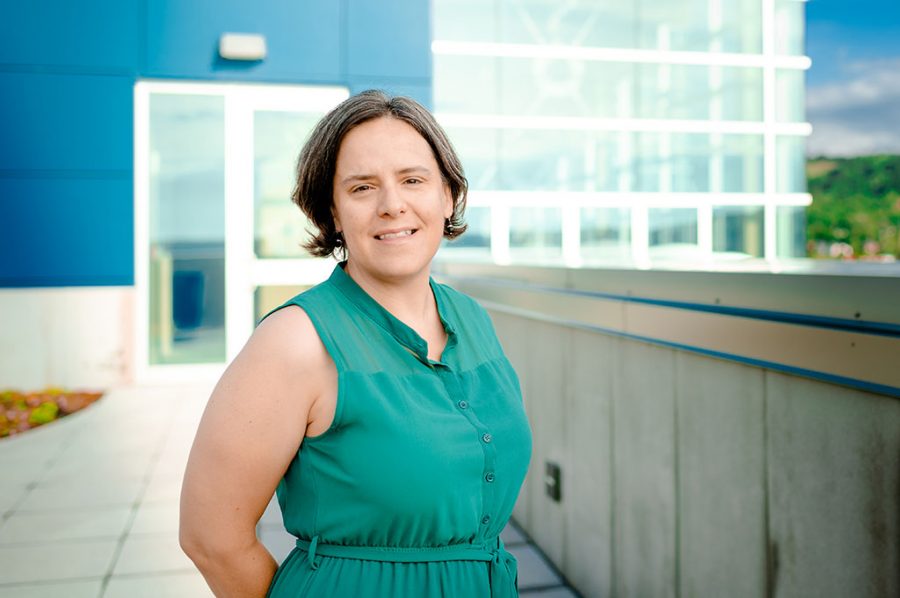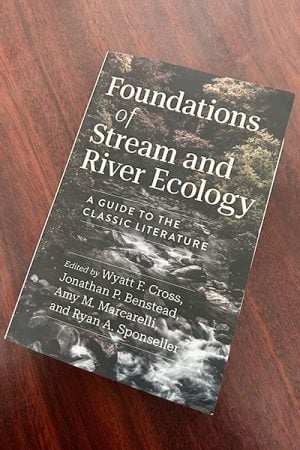
Biological Sciences professor Amy Marcarelli is the proud co-editor of recently published Foundations of Stream and River Ecology: A Guide to the Classic Literature. The book is a continuation of the University of Chicago Press Foundations of series, which began with the first publication of Foundations of Ecology over 30 years ago. The series had temporarily lapsed in publications as resources for academic papers shifted to digital availability, but has been brought back with a new perspective in this latest addition.
Previous editions in the series reprinted academic research papers in their entirety, with a brief introduction explaining the editors’ reason for including those particular papers. The goal, Marcarelli said, was to get these foundational papers into the hands of graduate students and others exploring a new field. Now that academic papers are more readily available online, Marcarelli and her co-editors took a different approach with their compilation.
“If you don’t know the original literature you run the risk of reinventing the wheel.”
The book is designed to not only refer researchers to classic literature in the field, but to provide additional context to each paper’s place in the history of stream and river ecology. Instead of fully reprinting each paper, the book is presented as an annotated bibliography with summaries of each paper, and a “looking forward” section highlighting changes to the field after those papers were published.
This book is also the first comprehensive work of its kind in the relatively new field of stream and river ecology. While most established labs and courses have a recommended reading list passed down by mentors, Marcarelli said this is the first compilation published with additional context for those papers. Most papers included in the book were published before the 2000s, which was an intentional reaction to the modern landscape of digital research paper databases.
“When students go to do research there is sort of a sense that newer papers are better or sometimes it is more difficult to find older papers,” said Marcarelli, “Some of those indexes don’t go much before the mid-80s or they have poor coverage of papers before then.”

Marcarelli and her co-editors have found many seeds of unexplored ideas and unanswered questions still exist within older, classic papers and wanted to bring them to students’ attention.
“A lot of those early papers have a lot in them, and they get cited for one thing but there is so much more material and ideas embedded in those. Things that in our current, concise, very focused scientific writing style we don’t include in our modern papers but they are certainly there in the older papers,” said Marcarelli.
Marcarelli was invited to the project by her long-time colleague and lead editor Wyatt F. Cross. While she has never done research directly with Cross or her other co-editors, Jonathan P. Benstead and Ryan A. Sponseller, they have all collaborated in their shared field for many years and are members of the Society for Freshwater Science. The project was created with editors from a variety of backgrounds to provide additional perspectives, and that intentionality carried over to discussions of diversity when editing the book.
One of Marcarelli’s major contributions to the book was reconciling who did the research behind each paper and why, as well as who may have been excluded from the table in the past.
“You can’t discount the work that was done in the past because it was done in a culture where some people had opportunities and some didn’t, but you also have to be careful not to exacerbate past sins, for lack of a better word,” said Marcarelli.
Though Marcarelli said stream and river ecology has had key female leaders since the 1970s, representation in the field has still been predominantly male and white. Editors focused especially on highlighting diverse voices of up and coming researchers in the book’s “looking forward” sections. Their journey to encourage diversity in the field is expressed in greater detail in the book’s forward and epilogue.
“We talked a lot about not just paying attention to things like citation count. Thinking about where there might be papers by groups or people that maybe haven’t been recognized as as important as they should be and trying to highlight those where possible,” she said, “not just thinking about gender diversity, but also about geographic diversity.”
Copies can be purchased through The University of Chicago Press. Marcarelli also plans to make copies available in the J. Robert Van Pelt and John and Ruanne Opie Library as well once they have been shipped to her.
About the College of Sciences and Arts
The College of Sciences and Arts is a global center of academic excellence in the sciences, humanities, and arts for a technological world. Our teacher-scholar model is a foundation for experiential learning, innovative research and scholarship, and civic leadership. The College offers 33 bachelor’s degrees in biological sciences, chemistry, humanities, kinesiology and Integrative physiology, mathematical sciences, physics, psychology and human factors, social sciences, and visual and performing arts. We are home to Michigan Tech’s pre-health professions and ROTC programs. The College offers 25 graduate degrees and certificates. We conduct approximately $12 million in externally funded research in health and wellness, sustainability and resiliency, and the human-technology frontier.
Follow the College on Facebook, Instagram, LinkedIn, X and the CSA blog. Questions? Contact us at csa@mtu.edu.